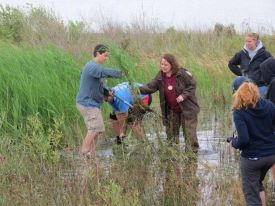NSSGA members are leaders in taking aggressive action to protect our environment and produce construction materials in a responsible and sustainable manner. NSSGA supports science-based federal standards that protect public health and the environment and provide economic opportunity. Below are issues NSSGA continues to work on within this topic.
Environment

Aggregates are Part of the Climate Solution
Demand for aggregates and industrial sand to support renewable energy development is rapidly increasing. Innovative infrastructure projects are essential for reducing greenhouse gas emissions and enhancing community resiliency to withstand the effects of climate change. The aggregates and industrial sand industries are committed to taking reasonable steps to reduce greenhouse gas emissions, while supplying essential materials. Our greenhouse gas emissions are inherently low due to the characteristics of our products and processes. The plants and facilities that produce these necessary construction materials use relatively little electrical energy or fossil fuels.
Despite low baseline emissions, these industries continue to be leaders in responding to climate change and are constantly evaluating ways to reduce energy use. For example, companies are promoting recycling, making crushing and screening processes more efficient and using new refrigerants with lower warming potential for air-conditioned truck cabs and offices. The aggregates and industrial sand industries have undertaken many greenhouse gas mitigation efforts, such as investing in fuel-efficient mobile equipment; installing renewable energy generation facilities; using biodiesel fuels for mobile equipment; and improving operational efficiency. The end producers of asphalt, concrete, and cement are using innovative technology to further reduce the carbon footprint of the materials they produce using the aggregate. We support incentives, grants and opportunities that will drive investments into modern technologies and equipment that reduce energy use, air emissions, and increase sustainability.
Greenhouse Gas Emissions Calculator

NSSGA has provided a greenhouse gas emissions calculator since 2008 to assist aggregate producers and pulverized mineral producers calculate emissions of greenhouse gases (GHG) in an accurate, consistent and verifiable manner. The GHG inventories provide emission baselines and are a useful tool for evaluating options for reducing GHG emissions.
Greenhouse Gas Emissions Calculator
Buy Clean Policies
NSSGA appreciates the increased focus in Congress and by the administration to create opportunities that promote the use of sustainable building materials. It is imperative the programs established by the Inflation Reduction Act and the Biden administration’s procurement actions follow the law, as written by Congress and incorporate industry input. The industry led aggregates Environmental Product Declarations (EPD) process is a critical tool to achieving shared sustainability goals. Creating new burdensome procedures and regulations will only slow our ability to deliver sustainable materials that are being developed by America’s aggregates producers.
Environmental Applications
Construction aggregates are used in many environmental applications such as landscaping, erosion control, water filtration systems, wastewater, and sewage control, and drinking water. NSSGA members are responsible stewards of water resources, and regularly undertake land reclamation activities that include wetland restoration, creation, and enhancement, as well as wetland mitigation banking for internal and external use. Land reclamation activities conducted by NSSGA members have long been known for their ability to create much-needed additional flood storage capacity.
Water uses of aggregates include:
- Filtration
- Sewage treatment
- Wastewater control
- Septic tank leaching fields
- Infiltration for aquifier replenishment
- Acid Neutralization
- Streams
- Lakes
- Concrete and Asphalt Construction for Public Works Infrastructure
- Sewage treatment plants
- Water purification plants
- Dams, reservoirs and water supply
- Utility lines (water, sewerage, electrical)
Regulations
NSSGA members are leaders in taking aggressive action to protect our environment and produce construction materials responsibly and sustainably. NSSGA supports science-based federal standards that protect public health and the environment and provide economic opportunity.
- Waters of the US (WOTUS) Definition: Producers need clean water and clear rules to provide aggregates and industrial sand in a timely and responsible manner for vital infrastructure and environmental projects. While the unanimous Supreme Court opinion on Sackett limited federal jurisdiction, the lack of definitions and clarity from the agencies cause delays that make it difficult to supply the unprecedented amount of infrastructure projects under the IIJA and other federal investments. NSSGA believes a proper balance can be struck to protect federal waters responsibly while allowing state control of land use, as intended under the Clean Water Act.
- Particulate Matter (PM) Rule: Under the Biden administration, the EPA reduced the PM (PM2.5) standard to a level that will send many locations in the U.S. into a nonattainment status. This may unnecessarily create problems for aggregates and industrial sand operators, as it will impose new requirements on existing operations and make permitting new operations difficult in these areas.
- Endangered Species Act: The Endangered Species Act has historically been ineffective in the revival of threatened and endangered species. NSSGA supports common-sense reforms to allow more state and local program expertise to solve complex species and habitat issues, as well as voluntary efforts by industry to create and enhance habitats.
- Sustainability and Biodiversity: Aggregates and industrial sand producers are proactive members of their communities. Operators ensure closed sites are responsibly reclaimed and add community benefits once extraction is completed. Reclaimed quarries can take many forms depending on where they are located, including farmland, parks, wildlife habitat areas, water reservoirs, community developments, recreation spots, nature preserves and alternative energy generation. NSSGA members are effective stewards of the land. They value innovation that enhances sustainability throughout the supply chain and creates state-of-the-art solutions that improve our homes, businesses and schools. For example, finding environmentally and socially beneficial strategies to utilize quarry fines (traditionally a waste material) in road construction, as a soil enhancement, or sequester of carbon. NSSGA supports incentive-based programs and a flexible sustainability strategy that allows our members to increase their operations’ sustainability during extraction and reclamation based on the individual needs of each business.
